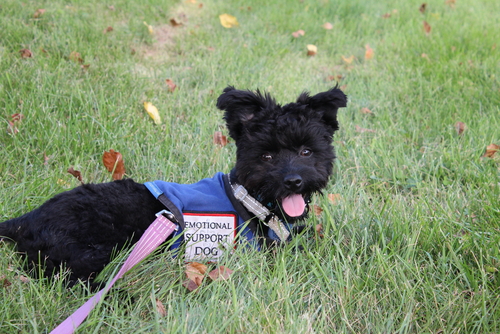“My little dog—a heartbeat at my feet.” – Writer Edith Wharton

By: Lisanne L. Mikula, Esquire
For decades, the right to bring service animals into areas of public accommodation has been established under anti-discrimination laws. A service animal—which is defined as a dog, regardless of breed or type, that is individually trained to do work or perform tasks for the benefit of a qualified individual with a disability—must be allowed to accompany a disabled individual in public places, such as, for example, government buildings, courthouses, office buildings, restaurants, theaters, hotels, and public transportation vehicles.
Over the past several years, there has been a sharp increase in the use of emotional support animals. Unlike service animals, emotional support animals—also known as comfort animals or companion animals— can be any type of animal and are not trained to do work or perform specific tasks. Rather, emotional support animals provide companionship aimed at alleviating distress or anxiety or to provide some other type of relief.
The rules regarding emotional support animals are a patchwork. Unlike service animals, whose presence in public accommodations is protected under laws prohibiting disability discrimination, there is no similar broad legal protection for persons relying on an emotional support animal. Instead, the rules vary by industry and, in many cases, by individual entity.
For example, in December 2020, the US Department of Transportation revised its regulations under the Air Carrier Access Act to clarify that while airlines must allow boarding of properly documented service animals, they are not required to allow emotional support animals in the passenger compartment. This change was prompted by airlines encountering complaints about the influx of non-service animals in passenger cabins, such as peacocks, https://youtu.be/0AevlbMEqEg, pigs https://youtu.be/Nfp5O4pfoPg, horses https://youtu.be/GtPRrW3strM, and turkeys https://youtu.be/dVwJZXSum_c.
As a result of this regulation, each air carrier is free to set its own rules regarding whether an emotional support animal is permitted to travel in the passenger compartment. Persons who wish to travel with their emotional support animal must be cautious when making their travel arrangements to ensure that their companion animal will be permitted onboard.
The use of emotional support animals in courtrooms recently reached Pennsylvania’s highest court. Joining 16 other states, the Pennsylvania Supreme Court ruled that under certain circumstances, a comfort dog may accompany a trial witness in court if the animal will allow the witness to testify in a reliable and truthful manner.
Before a 2018 murder trial in Chester County, prosecutors requested permission for Melody, a comfort dog, to sit with an autistic child witness who was fearful of testifying against the defendant. The trial court allowed Melody to be brought into the courtroom and placed in the witness stand before the jury entered and left the courtroom after the jury exited.
While the jury would not be able to see the dog, the trial court recognized the likelihood that the jury would notice Melody’s presence. To lessen the likelihood that the dog’s presence would engender sympathy, the court determined that Melody would be referred to as a “service dog” rather than a “comfort” or “emotional support” dog. The trial court advised the jury that a “service dog” was present in the witness stand and instructed the jury not to consider the dog’s presence for any purpose, not to attribute any sympathy to the witness because of the dog, and not to judge the witness’ credibility differently because of the presence of the dog.
The Pennsylvania Supreme Court held that trial courts have the discretion to permit a witness to testify with the assistance of a comfort dog. In exercising that discretion, courts should balance the degree to which the accommodation will assist the witness in testifying in a truthful manner against any possible prejudice to the defendant’s right to a fair trial and employ means to mitigate any such prejudice.
The Law Firm of DiOrio & Sereni, LLP is a full-service law firm in Media, Delaware County, Pennsylvania. We strive to help people, businesses and institutions throughout Southeastern Pennsylvania solve legal problems – and even prevent legal problems before they occur. To learn more about the full range of our specific practice areas, please visit www.dioriosereni.com or contact Lisanne L. Mikula, Esquire at 610-565-5700 or at [email protected]
DISCLAIMER
The information that our blogs provide does not, and is not intended to, constitute legal advice; instead, all information is for general informational purposes only. Information in our blogs may not constitute the most up-to-date information. Readers of our blogs should contact a qualified attorney to obtain legal advice with respect to any particular legal matter. No reader should act or refrain from acting on the basis of any information in our blogs without first seeking legal advice from a qualified attorney. Only the reader’s own attorney can provide assurances that the information contained in our blogs – and any interpretation of it – is applicable or appropriate to the reader’s particular legal issue. Use of, and access to, the information in our blogs does not create, and is not intended to create, an attorney-client relationship between the reader and our law firm or our blog authors.
Like what you see? Join our mailing list












